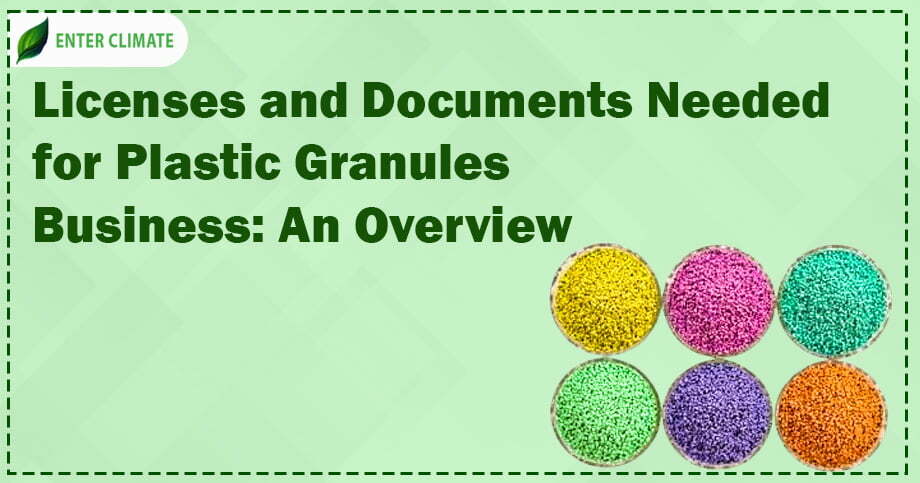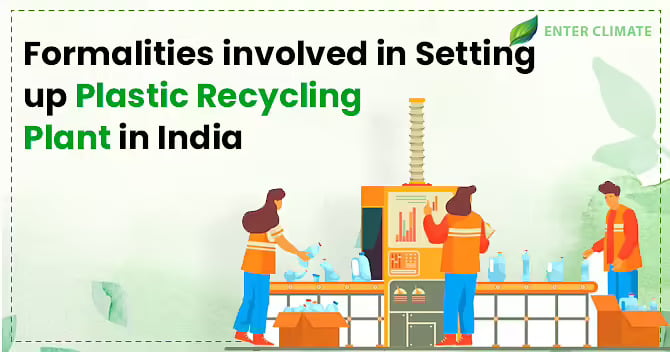Licenses and Documents Needed for Plastic Granules Business: An Overview
 28 Oct, 2022
28 Oct, 2022 
Reprocessed or recycled plastic granules are small homogenous plastic made from plastic waste comparable to virgin plastic in physical and chemical properties. Reprocessed plastic granules are made by recycling plastic wastes that are thermoplastic. These granules have a variety of uses as they show properties similar to virgin plastic and, as a result, reduce the consumption of new plastic. Such businesses are helping reduce the pileup of plastic waste in the country and our expenses on its raw material (crude oil) and manufacturing process. With reprocessed plastic being cheaper than new plastic, many entrepreneurs have successfully started plastic granule businesses with limited capital and technical expertise. However, certain legalities involved in the unit setup in the form of Licenses and Documents Needed for the Plastic Granules Business are required.
Also, some post-compliances have been mandated by the CPCB and respective SPCBs for this industry due to the polluting nature of plastic. The provisions of the PWM Rules, 2016 and its subsequent amendments in 2018 and, more recently, in 2022 lays down the different requirements for setting up this business. This article will give you a fair idea of the licenses and documents needed for the plastic granules business. So continue reading to find out.
Functions and roles of a Plastic Granules Business
There are many advantages associated with starting a plastic granules business too. They are easy to set up, need minimal machinery and space and can be operated by a semi-skilled workforce. Therefore, many businesses in and around plastic granule manufacturing are flourishing as the demand for their product is enormous. However, certain key areas in any plastic granule manufacturer must be researched to prepare a solid business plan ahead of investing in the business.
The function of the plastic granules business includes the following –
Granule Manufacturing: This is the key role of the Plastic Granules Business. For manufacturing plastic granules, the waste plastic bottles sorted based on the type of plastic, clarity or colour are washed and then shredded into flakes. These are fed into plastic processing units called extruders, which are converted into granule lumps by melting them. These lumps are put through a grinding machine to obtain granules of the required size. The waste plastic materials, therefore, are washed, melted, reshaped and finally sent to manufacturing units for production, eliminating the introduction of new plastic in the market.
Waste management: Wastewater in the form of effluent is the primary waste generated by the plastic granules manufacturing industry. This wastewater is used during the washing stage before grinding. The waste generated consists of oil, paints, stickers, food remains etc. Apart from the waste mentioned above, the wastewater also consists of detergents and surfactants used to clean the surface and the insides of plastic containers, bottles etc.
EPR Certificates: The Plastic Granules Business is also a key link in fulfilling the Extended Producer responsibility of producers. The plastic waste recycled by them as a part of the obligation of the PIBOs will enable the PWP to trade EPR certificates in return for the waste they process.
Required Licenses and Documents Needed for Plastic Granules Business
Setting up a reprocessed plastic business is relatively easy. Thorough market research and capital investment in the manufacturing unit are the prerequisites. However, obtaining all necessary authorisation and business licenses can be hectic and confusing due to various regulations governing this segment. This calls for assistance from experts in the field who can simplify your plastic waste business’s incorporation and registration requirements. Before starting a Plastic Granules Business, relevant business licenses and authorisation should be obtained. Here are the necessary authorisations required for a plastic items business
Business Registration Certificate
Registering the business with appropriate authorities will help obtain subsequent NOCs from different authorities like the CPCB and SPCB. The following documents are required for the same –
- Copy of PAN card
- The government authorised Identity proof – Voters’ ID or passport or driver’s license
- Bank statement
- Utility bills such as mobile bills or gas bills, or electricity bills – not older than three months
- Passport size photograph
- Specimen signature of the Director
Factory license
The Plastic Granules Business must register the premise with local authorities according to section 6 of the Factories Act, 1948. Documents required for obtaining this licence will depend upon the checklist issued by the respective state.
However, common documents required for these licences are –
- Duly filled in application form signed by occupier and manager
- Application fees
- Existing building plan
- List of partners/directors with their residential address
- NOC from other partners or Board Resolution by Directors for the nomination of the occupier as per sections 2(n) and 7 of the Factories Act, 1948[1]
- Proof of occupier as director/proprietor/partner of the factory
- Proof of sanctioned load of electricity (copy of electricity bill)
- Proof of occupancy (copy of rent agreement/ownership proof)
- Flow chart of the manufacturing process
- List of raw materials used in manufacturing
- List of machinery installed and such other particulars as the Chief Inspector/Director (ISH) may require
- All applications are scrutinised, and in case of a defect, the issue is communicated to the applicant, pointing out the defects within a month
Fire NOC
A fire certificate is granted by the concerned fire department of the respective state to ensure that commercial property is built with adequate fire-resistant measures.
The common documents needed are –
- Building plan layout regarding the construction
- Site plan, including the analysis report
- Aadhaar card and PAN card of the applicant
- Copy of approval letter and approved layout plan (each floor) by the competent authority
- Copy of approval letter and approved building plan (each floor)
- Building fire plans (each floor)/elevation plan of building/section plan of building
- Copy of ownership document (Lease deed/registry (Summarised copy)/ khasra)
- Copy of certificate of fire consultant’s qualification
Registration as a Plastic Waste Processor (PWP)
As per the notice issued by the CPCB in July 2022, PWP has been given specific mandates under the guidelines. These rules state that PWPs have to register themselves on a centralised EPR portal developed by CPCB. PWPs already registered with the SPCB/PCC must register online. This will enable the PWP to issue certificates for plastic waste processing that will be considered to fulfil EPR obligations by PIBOs. CPCB prepared the format for the EPR Action Plan required for obtaining registration as per the provision of PWM Rules.
Documents required for registration as Plastic Granules Business
- Copy of valid Consent to Operate
- Copy of certificate of registration by the District Industries Centre or Ministry of micro, small, and medium enterprises
- Supporting documents related to details of plastic waste
- Manufacturing process flowchart & description
- Details of pollution control devices
- Photograph of the unit/production site
- Details of worker/staff/management
- Copy of annual return submitted to local body and copy of annual online return submitted to concerned SPCB (in case of renewal of registration)
Consent NOC
A plastic granule manufacturing business has to obtain a no objection certificate, also known as Consent NOC, from their respective SPCB under the Air and Water Acts. This NOC is generally provided in two stages: Consent to Establish (CTE) at the time of inception or establishment of the business and Consent to Operate (CTO) before the unit starts operating. The Board also conducts a site inspection to ensure that the Plastic Granules business has complied with protocols required to set up the facility and has installed necessary pollution control devices.
Documents required are –
- Correctly filled application form of the concerned SPCB
- Signed undertaking
- Site or layout plan with a roadmap
- Detailed project report
- Details of the manufacturing processes and finished products
- Proof of installed machinery and the capital cost of the land, building, and plant machinery)
- Water balance, water source and required quantity
- Land ownership documents such as rent/lease agreement
- Industry registration documents
- Consent fee (as applicable)
- Any other document mentioned in the application
Conclusion
Plastic Granules are in demand by various industrial units manufacturing plastic products. There is a good scope for growth for the plastic granules business in any part of the country due to the cheap and readily availability of waste plastic. The Plastic Granules Business can be set up with assistance from experts that provide services to simplify and accelerate all the registration and consent requirements. Their knowledge and experience can help a business with documentation and necessary legal compliance to function without hindrance.
Read our Article:Requirements for PET Bottle Manufacturing Business












